Andre and Anita Chaperon are an entrepreneurial couple living in Gibraltar and running multiple businesses including AutoResponder Madness and Tiny Little Businesses. Andre is an expert at email marketing and story-based marketing. Anita is an expert at business and optimization processes, nutrition and hormones. Together, they focus on email autoresponders, story-based marketing, and creating automated systems to grow your business and your marketing.
Andre was a previous guest here on Marketing Speak – episode # 13. This time I have Andre back, with his wife, Anita. This episode originally aired on my other podcast Get Yourself Optimized. If you like this show, please do me a favor and subscribe to Get Yourself Optimized.
In this week’s episode, we cover lifestyle design, automating your business, biohacking, happiness, hormones, and living in exotic locations like Marbella and Gibraltar.
And now, on with the show!
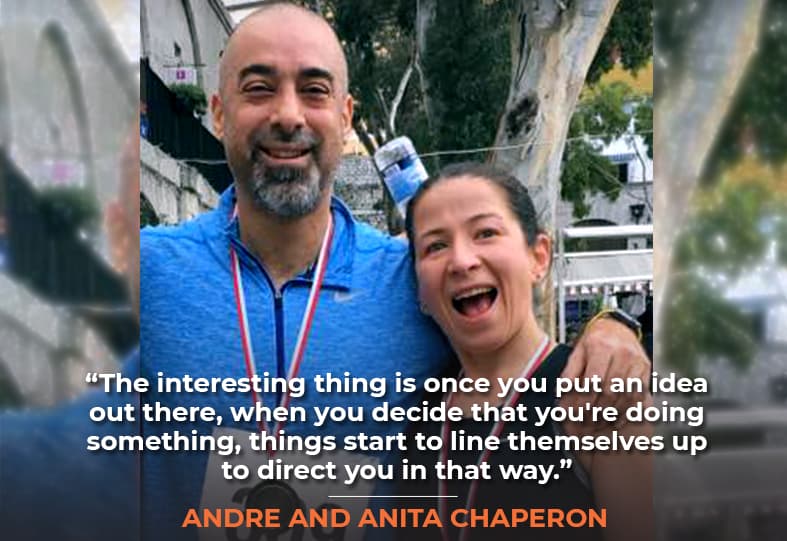
In this Episode
- [00:21] – Stephan introduces his next guests, Andre and Anita Chaperon, an entrepreneurial couple living in Gibraltar and running several businesses together, including AutoResponder Madness, Storyfluence, and Tiny Little Businesses.
- [01:17] – Stephan asks about their chosen lifestyle and their reason for living in an exotic location and a peninsula.
- [04:48] – Anita and Andre shared the lesson they learned during the crisis that affected small businesses and told how appreciative they were of their online business that is not tied up to anything.
- [07:19] – Stephan wants to know more about Gibraltar and why they chose to stay and live there.
- [09:29] – Andre, Anita and Stephan talk about the uniqueness and fascination while living near the beach.
- [11:39] – Andre and Anita share how they decided to restructure their company to become mobile, tips on paying taxes and placing corporate accounts in Singapore and Hongkong.
- [18:28] – Stephan asks what a story coach is for and wants to know the advantages and examples of story-based marketing.
- [23:00] – Andre and Anita enumerate the benefits of having a business coach for strategic planning and business growth.
- [27:33] – Anita reveals her journey of becoming an expert on hormones.
- [31:13] – The discussion about Women’s Hormones, addressing hormonal issues, and diagnosing the cause through assessment and blood works.
- [39:56] – Stephan wants to get Andre and Anita’s recommendation in getting a full blood panel.
- [42:57] – Visit Andre’s website to know more about business strategies and Anita’s website to learn more about health, hormones, and products.
Transcript
Welcome, Andre and Anita!
Anita: Hey! Hi, Stephan!
Andre: Hi Stephan! It’s great to be here!
Let’s kind of dig into the topic at hand right now which is, lifestyle design. Why Gibraltar and previously, Marbella in Spain, which are very exotic locations that I might consider going on vacation but you live there year-round, how did that come about and why do you continue living in the middle of essentially nowhere and is a tiny, little island?
Anita: Well, the whole thing started for a long time back. Andre and I have been together for a long time. I found him actually. I’ll claim that I found him in Africa because he is born there. I’m originally from Bulgaria and my mother and I left, when I was about 14, to go and live in Durban, South Africa. That’s how we know each other and that’s how our journey started. It turns out that we’ve always been “European babies” so our first stop was in the UK. We did about 8-and-a-half years there. We started our business and then we came to Marbella, where my mother had a holiday place at that time. Andre and I came to visit in, I think, it was in 2002—
The interesting thing is once you put an idea out there, when you decide that you're doing something, things start to line themselves up to direct you in that way. Share on XAndre: 2002.
Anita: 2002, yeah. We fell in love with the place. Like you say, it’s actually, in our books, the perfect place to live. It’s got long stretches of beach and everyone is constantly partying pretty much, etcetera so—
Andre: We were both still working 9-5 jobs at that time so it’s worth mentioning that because the trip to Marbella was a holiday but it changed something in our minds. It shifted things so when we went back to London, it was like, “We need to change something!”
Anita: Yeah, and as soon as we came back from that visit, we decided to make the move permanently and have gone to live in Spain for the next ten years. That was our first kind of ten-year plan.
The better I became at telling stories, the more money I made.
Andre: Yes, it’s a ten-year plan.
Anita: So, yes. But it turned out that it only took us six years, basically, to make it.
Andre: Five.
Anita: Okay, five. Sorry! Gee, we probably lost a year in nagging.
Andre: We do it half the time.
Anita: Yeah, we do it half the time. The interesting thing was—we’re great believers now but we didn’t know it at the time—but once you actually put an idea out there seriously enough, when you decide that you’re doing something, things start to line themselves up to direct you in that way. So, I guess we did do a little bit of a detour because we wanted to come back to Marbella but we also want to experience the Spanish thing and Marbella is a little more “touristy” so we went and we did this Spanish thing for about a year and a half or 18 months in an amazing place but a lot farther up the coast where everything is Spanish.
We’re great believers now, but we didn’t know it at the time.
Andre: Yeah, we were living in this place called La Manga Club. It’s huge. It’s supposedly one of the best resorts in the whole of Europe and we found ourselves living there, which was amazing. We have actually just moved in—I don’t know, maybe six months to a year, I can’t remember the date— so, in 2007-2008, when the crisis hit, although it did not affect us directly, it affected everybody else who were living in this nice place in paradise. People were suddenly setting up and leaving and this amazing place turned almost into a ghost town overnight.
That’s so strange because you guys insulated yourselves from the downturn but everybody around you was affected. That’s pretty interesting.
Anita: It was, and I was going to add that it gave us a really stark lesson in how the crisis affected small businesses. Some people, especially online entrepreneurs, you might hear about the crisis hitting and how it’s affecting people in the news but when you actually see a quite vibrant community turn into a ghost town because pretty much everybody has closed shop, it makes you feel really appreciative of the fact that you’ve got an online business that is essentially a nomadic business that is not tied up to anything. You know, the thing that Andre had the foresight to get us into is not to have physical products so that we don’t actually have to worry about inventory, storage, cash flow, or anything like that. From day one, he had the vision to set up everything in autopilot as much as possible.

Andre: We essentially just decided that it’s time to move after the crisis to Marbella because it was always going to be livelier everyday—crisis or no crisis. We ended our rental agreement, jumped in the car, drove down with our two cats, and just set up shop again. It was nice to have the ability to do that.
I can totally relate because four years into my business, my previous concept called Netconcepts, I decided why not live in New Zealand, which was really a quick and an “out there” idea. I’ve never even been there! I’ve applied for residency, got in, and moved my family there, which was an incredible experience but people thought I was crazy. You’re going to move halfway around the world—and I didn’t have the same kind of business that you guys have where it’s just digital products. At the time, it was an agency where we had clients that we were servicing and they were all pretty much, US-based. Some of them were pretty big-name companies like Birds Eye and I was hoping that they will still stick around even though I, the founder, was moving half the world away. It worked out, luckily, but I figured, “You know what? I’ve had about 50-50 shot at this working out!” so I took that chance because I want to live an exotic lifestyle and be able to raise my kids somewhere incredible and give them a cosmopolitan view of the world instead of this ethnocentric view just living in the same place year after year. I totally relate.
We wanted to be mobile; we had to set it up in a way that it’s good for no matter where we decide to set it.
You, guys, are in Gibraltar now and actually, I should correct myself because I said that it was an island but I’m looking over my notes and it’s a peninsula where there are about 30,000 people in that peninsula. Why Gibraltar?
Anita: It was actually two corrections. It feels like an island even though it was just a peninsula so you’re right there, technically. But also, it’s 30,002 people with Andre and me. It was almost a creative outcome that we’ve been thinking for a while because we loved living in Spain but in our opinion, and again we’re not lawyers or anything like that so I’m not giving advice to anybody else, but we just felt that Spain does not know how to support small businesses and they don’t know how to support online-based businesses, which we find very difficult. I’m not saying that’s the experience for everybody, I’m pretty sure some people think it’s amazing to work in a Spanish setup. For us, we just find it too unstable and we wanted to take the next step and scale a company so we had to look for elsewhere to go and we decided that America wasn’t for us because it’s a little bit too big and we really feel close to Europe and because we like Marbella so much, Gibraltar seems like a really, really good because it’s literally, 40 minutes down the coast from Marbella—-
Andre: Driving.
Anita: Driving, so it’s really easy to go back there every single time you want to. Also, even though Gibraltar is a separate country from Spain, it’s built on
the side of Spain, and going across the border takes about five seconds. It’s really a good central place with a stable economy and very good tax rates for companies. Plus, we speak the language over here, English, so it makes a lot of sense and we’ve learned to love it ever since because it’s an acquired taste. I guess, with any exotic location, there’s a bit of adjustment.
And you guys are on a beach or near the beach, I’m taking it?
The better you feel about yourself mentally and physically, the better you'll do in business. Share on XAnita: Well—
Andre: We are kind of in the entrance of the harbor over there. It’s a small place, like I said, so I don’t know how to explain it.
Anita: The whole of Gibraltar is 2.5 square miles so anywhere you are, you’ll be looking around the water. Our place, the one we chose, has floor-to-ceiling windows where we look out onto the harbor from. The view is pretty much 180-degrees.
Andre: One of the things I like to tell people, because it’s so unique, is that from our living room, we can see two continents and three countries from one view.
Anita: On a clear day, of course.
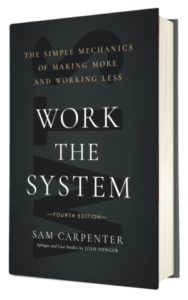
Andre: On a clear day, we can see Africa, honestly.
That’s amazing. Now, in New Zealand, one of the last places I’ve lived was on a cliff that looked out on a bay called Corsair Bay. It was just magical. Now, my fiancée and I are four blocks away from the beach in Santa Monica, which is a wonderful location but we never make it to the beach and we’re like, a five-minute walk away. It’s just ironic. Maybe once a month we’ll go to the beach together so if you’re not on a beach, it seems like you just don’t make it to the beach. Is that the same for you, guys?
Anita: When we were up in Marbella, yes, it was pretty similar. Over here, the beaches are slightly more, I guess, you would call them exotic again because it is such a small place. The beaches that we have are not so easily reachable and they’re not within walking distance, believe it or not.
Andre: Yeah, over here they’re not but—
Anita: But we do have swimming pools and stuff like that.
Andre: When we were in Marbella, we were at two different properties. The first one was literally on the beach and we loved it because we actually did walk onto the beach because it was that close.
Anita: Daily.
Andre: Then we just moved across the road, literally, and then the exact same thing happened that you mentioned where, just because it’s five minutes away now instead of 30 seconds, we just didn’t go down nearly as regularly as we used to. It’s the strangest thing.
Anita: Yeah.
The solvency of the bank that we chose was quite stable.
Well, let’s talk about how you structured this to be in multiple locations, kind of like a global business. You’re in this tiny peninsula, Gibraltar, and yet you do business with the world. You bank out of Singapore, you have citizenship in other countries so, you guys, kind of, by default, follow the Five Flag Theory— which, before we started the episode and we were chatting about it, you guys weren’t even familiar with and yet you were already following it. It’s pretty cool. For those who haven’t heard the episode with Domingo Silvas, we talked about Five Flag Theory on that one, where you have a different kind of country flag that you stuck into—whatever country where you decide to reside in is different from the one where you decide to have citizenship in or dual-citizenship in; where you bank in, or have your business in, or to vacation and have fun in. These are all different countries from each other and that helps diversify your risks and protect your assets and potentially, minimize tax if you do it right. So, why Singapore for you, guys?
Anita: There’s a lot of explanation behind and we didn’t come to this conclusion right away as it was quite a difficult decision. Basically, Andre is probably going to chime in as well but we wanted to, with the move out of Spain, we wanted—well, we needed—to restructure the business because obviously, we were no longer paying taxes in Spain once we live it so we had to set up business here in Gibraltar. We’ve, obviously, always wanted to pay taxes and one of the points was to figure out how to protect our income and at that time, the economy, especially the US dollar, wasn’t dominant anymore and— Andre, do you want to mention it because you were the one who—
Andre: Yeah. As you know, when we move to Spain, we actually set up our entire company in Spain and it wasn’t the best decision in the world. In hindsight, we figured it out. When we decided that we’re going to leave, like Anita mentioned, we decided to restructure everything in the way that no matter where we decided to live in the world, everything else didn’t have to change.
No matter what level you are in your craft, you should get a coach because that's the only way you're going to keep progressing. Share on XAnita: Because it was quite expensive to repatriate the company and we’ll start opening up branches and etcetera so because we knew that we wanted to be mobile, we had to set it up in a way that it’s good for no matter where we decide to set on.
Andre: Yeah, so one of the guys that I was following at the time because of this—and I was also Masterminding with a friend of mine—is this guy called Simon Black from Sovereign Man. I was reading his stuff and I subscribed to his membership things so that I can get deeper insights into what he does and he’s learned about this so that’s all he does. Right or wrong—whatever your views are or his views are but that’s what he does and so I thought, “I’m never going to learn this thing,” to the depth that I need to learn it in. We also spoke to a whole bunch of lawyers and what-nots so anyway—
Anita: And financial advisors—
Courage is different from just reading information.
Andre: Yeah, so we’re following Simon Black’s advice and he’s the one who said that the best place to put your corporate account is in places like Singapore and Hong Kong. He got a whole list and the main reason is, although at the moment, the US dollar is the reserve currency, one thing is for sure, there is 100% chance that one day in the future, it’s not going to be the reserve currency. History recycles and things happen, right? So, at some point, it’s not going to be anymore and so, that was his reasoning—that the banks there are very solvent. He’s got all the statistics on all the banks and he is not connected to any of these companies. He just simply lists the companies and if he’s got any relationships with any other banks in the various territories, he’ll say, “Well, I’ve dealt with these guys,” and he lists them so he makes it nice and easy for you to reach out and actually contact these places and then do your own due diligence. We just decided to go with Singapore—
Anita: Well, one of the reasons was because we didn’t want to fly all the way to Singapore and HongKong, because that was our first choice. After quite a few phone calls, contacts, and investigations, we managed to convince the guys at this London branch of the Singapore bank that we chose to meet us there and allow us to sign the papers in London rather than having to go all the way around.
Andre: Yeah, they’ve got a London private branch so we managed to get there and do the deals so that’s how we chose Singapore as our corporate account. So, our currency is sitting in Singapore dollars, for the reason that one day we might wake up and the Euro and the US dollar- there are more dominant players and your currency is becoming essentially becoming devalued by X percent. That was the reason I guess.
The best place to put your corporate account is in places like Singapore and Hong Kong. Share on XAnita: It’s also because the solvency of the bank that we chose was quite stable so don’t get us wrong, we’re not like some sort of a paranoid couple who goes around protecting our currency, but it just seems like a really good setup to not to have to worry about that.
It makes a lot of sense because if you look at the US, for example, there’s this called the FDIC that supposedly insures all of our bank accounts but there is very little money in the FDIC to cover all the accounts in the US. It’s like a single-digit percentage that they could cover so it’s kind of a joke. And also, it’s only up to $250,000 so you put, let’s say, $500,000 to $1,000,000 to an account, only $250,000 of that is covered and the rest is uninsured, which is really scary. You need to have multiple accounts, even if it’s with the same bank. At least, have multiple accounts if you have more than $250K. Lots of people don’t know that and it pays to be informed.
I can attest to the power of having a business coach to accelerate your growth.
Let’s talk a bit more about advisers. You had a great adviser in the form of Simon Black. You have a business coach. You guys have a story coach as well, which I had never even heard of before, that you can have a story coach but it makes sense since your business is all about story-based marketing. You have the Storyfluence product. Why a story coach and what is a story coach?
Andre: Well, Michael Hauge is based in Hollywood, Los Angeles so he’s not far from you. One of the things, I’ve figured out— and I’ll give you the quick story—is that the better I became at telling stories, the more money I made. It essentially boiled down to that. I have a passion for telling stories although I’m dyslexic and I can’t spell. I just enjoy telling stories and communicating my marketing through the channel stories. I was limited by how much knew and you know, you can read so many books but until you have the courage that—and courage is different from just reading information—and that was it, really. I just went to Michael Hauge’s website and I clicked on his “About” tab. I saw that he offered consultation and I think, at that time, it was $400 an hour and I was just restarting and said, “Hey, can I buy some of your time?” and—
Anita: He can recommend it to you and then you can just find out—
Andre: He did recommend it but I’ve never communicated with him before so I just waited and reached out that way and said, “Can I buy some of your time?” and that’s how the whole thing started up. I bought ten hours of his time, I’ve blocked his ten hours, and we just went through some of the stories I was working on and that’s how the relationship started.
Storytelling is so powerful—it’s crucial for writing & copywriting.
Anita: But do you know, the bottom line is that, no matter what level you are in your craft, you should get a coach because that’s the only way you’re going to keep progressing.
Andre: It’s the fastest path too.
You say that the better you get at storytelling, the more money you make. Can you give a specific example?
Andre: Most of my outward-facing stuff is wrapped around stories and I just found, at the time, some of the things that I put out there, whether it was an email or a website or a page that I created, some of them worked really well and others worked mediocrely. There was always this something. It was some component that I wasn’t aware of but knew that it existed. Most of them worked really well but then every now and then, there was one that just didn’t quite resonate in the same way so I chalked it down to my ability to tell a good story was—sometimes, it just so happened that it came out in the wrong order, some parts where my sequencing was at. That was one of the biggest reasons and so when I reached out to Michael, I put some of the stories in front of him, you know the ones that work really well and the ones that were more mediocre. It became really clear that the way that I sequenced those stories out, the good ones were done well and the other ones weren’t. They were out of sequence and it’s literally, as simple as that. Understanding what that framework looked like allows me now to be able to write in a more intelligent way because now I can build up the tension and the story in the right sequence and it just has a bigger impact.
Restructure your company in a way that no matter where you decide to live in the world, everything else doesn't have to change. Share on XStorytelling is so powerful—it’s important for writing, for copywriting, as you say. I just had recently Michael Port on the show as a guest and he was talking about storytelling and performance in your speaking, in your public speaking, and that was an amazing episode as well. I’m all for incorporating great storytelling into everything that you do.
Now, let’s talk about business coaching because you get business coaching from James Schramko, who I also had on the show. I’ve also had him in Marketing Speak. He’s great. He got some really popular podcasts, really great masterminds, Silver Circle. He’s a great marketer. What do you get out of getting a business coach involved in your strategic planning and your on-going growth of your business?
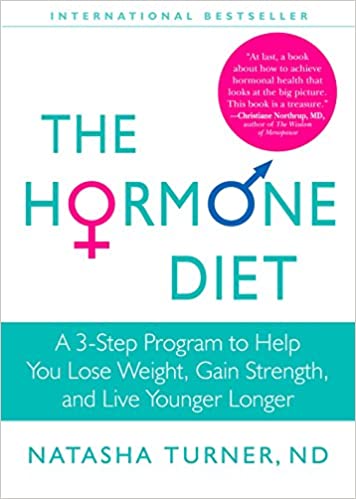
Anita: Well, the way we looked at the time when we decided to just sign on with James—because we met James through different events we were attending so we’ve known them already. We’ve also heard that he was really, really good. He’s basically a treasure trove of information but on such a vast amount of topics. We went to him initially because we wanted to be held accountable because we thought, “Okay, fine, if we create our visitors and we were putting up products that are really good quality and we were engaging our customers and that was going well but we want to execute a lot faster.” James, originally, when we signed him up, we wanted him to help us to basically to find our feet—the terminology. It turned out to be a lot deeper relationship and he’s ended, and we joke about it quite often, that he had ended up being a half-marriage counselor as well because Andre and I have been together for a very long time and there is a certain familiarity that comes into the business relationship because we’re going together as a couple. We are also very strong-headed individuals so when our views match, we’re really strong but when we don’t match then we fight really badly—meaning, we stand in each other’s ground, right? So one of the areas where James has helped us is to mediate. If we have any disputes, we simply say, “You know we’re going to defer it to James,” and see what he says. We never tell him who’s taking whose side although now that he’s worked with us for so long, he probably knows who said what. In terms of business, I need this much experience that you have as a business and as you grow, you come against challenges that—yes, you can borrow a book and try to adapt it to your company, your situation, or your team, etc.—but if you have a business coach with a lot more experience because James has been to quite a lot of different business setups and quite a lot more years of being in business, it’s good to get a third perspective—an outsider’s perspective—looking into the business. He’s a style of business is like a fiduciary—he doesn’t tell you what to do. In fact, I don’t think we’ve ever gotten a piece of advice where he says, “You must go and do this!” and he will always explore to see what the feeling is and then suggest things that you might want to explore. He just makes you think a lot and I find incredible value in that.

Andre: Yeah, I mean, that’s basically the key. You just get there faster. I mean, our weak points have always been systems and processes although Anita has become an amazing systems-and-processes person. I’ve read Work the System by Sam Carpenter, which is a really good book, and it’s doable—you can read it but then applying it to the business can sometimes be challenging so getting James at that point and James is great at that so he just helped us install those systems into our business and help us understand them.
I have a business coach myself—actually, I have several so I can attest to the power of having a business coach to accelerate your growth. Now, let’s move to a completely different topic and talk about biohacking because I know you guys are really into it. I’m into it myself. I’ve had several episodes covering biohacking already. A brain-hacking with Shaahin Cheyenne, biohacking with Joy from the JingSlingers—we actually covered that area and crossed two different episodes with Jay and Joy. I’m just really keen on exploring the biohacking area and also quantified self and all that sort of stuff. One specific area that really piqued my interest—we’re talking about before the episode started—was hormone-therapy and hormones. Anita, you’re a bit of an expert on hormones but you weren’t earlier. You kind of, by necessity, you had to become one. Could you share a bit more about that journey?
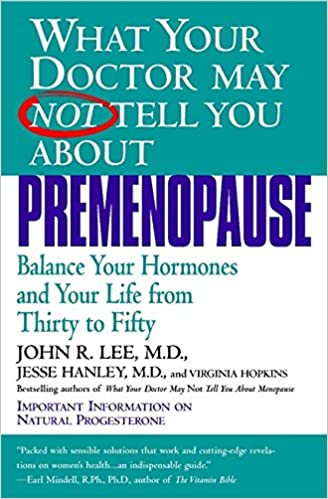
Jesse Hanley and John R. Lee MD
Anita: Yeah. Well, you’re absolutely right. I had to pretty much address the hormonal issues but that came around to another I suppose different and unique way. First of all, I’ve got to say, that obviously, none of this is meant as a piece of medical advice. This is just my journey and how can you talk about it, because I’ve got a bird-eye view and I’ve had to research a lot of things. Basically, when I was at the age of about 31, I was diagnosed with depression. I’ve always been a very logical person so for me, that was a big surprise because I had absolutely zero to be depressed about and I went about analyzing my situation just like I do with every business challenge and I just basically established that this is, rubbish. I said to the doctor, “You know, you’re a very nice person but I’m not going to take anti-depressants because I don’t have the reason to. There’s something on the line here,” and the way things manifested, for me at the time, I had started not to believe in myself and not trust in myself. We all live through some doubts in our lives, especially if you own your own business and you’ve moved to three countries, etc. I knew that there was a lot deeper than that and at the time, we came across an interview at an American chat show with Suzanne Somers, and Andre, being the compulsive book-buyer that he is, and he didn’t even ask me because he knew I was suffering through stuff, he just went and bought the book that Suzanne Somers was talking about—and that book, I still recommend to this day—I bought it for all my best friends—it’s called Breakthrough. I know Suzanne has got her critics across the globe and that’s fine because people that come up with novice ideas always have critics. But that book pretty much changed my life. We went to Spain at that time and I found a hormonal doctor who looks like a gypsy and I don’t mean that in an offensive way but his website was horrific. I found him on the other side of Spain from where we’re living so we had to travel for quite a long time, like five hours, just to meet him the first time around. So basically, that started my journey in exploring the hormonal issues, especially, to do with women initially but later on, as it is with biohacking, you start off with one thing, and then you just build from there. So later on, we with Andre for male hormones, etc. I don’t know if there’s anything specific that you want me to talk about.
Yeah, well, I’m very interested in hormones. We had a whole episode of the show dedicated to pretty much testosterone—that was the Chris Gatchis episode. We don’t need to really delve too much into testosterone but let’s start with the women’s hormones and this is a topic that I have a keen interest in. My fiancée, Orion, has a keen interest and she’s reading a book called The Hormone Diet, and is loving it. It’s just a fantastic book and she wants to start implementing some of the strategies from it. So, let’s talk about women’s hormones and what needs to be balanced, and what ways?
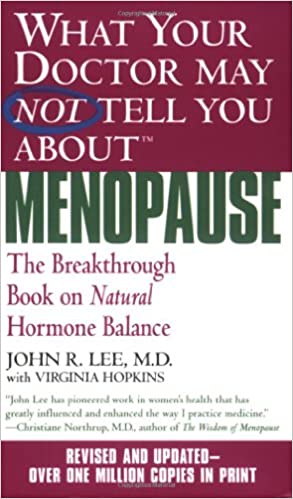
John R. Lee MD
Anita: Okay, well, the quickest thing that I just want to put out there is one of the books that I would recommend any woman read beyond the age of 40 even is called What Your Doctor May Not Tell You about Pre-Menopause and What Your Doctor May Not Tell You about Menopause. One thing that I didn’t know and it took me completely by surprise is that the pre-menopause for the woman at the age of about the late ’20s and early ’30s, which to me was absolutely shocking because you only hear about the menopause when you’re 50-60. That’s the one book that I would suggest to start with because it covers hormonal issues in very broad, friendly way since hormones can be quite deep and scary in stages. In terms of where to start with women’s hormones, I would suggest that you start with your thyroid and that goes for both men and women but more importantly for women because there are more women that suffer from thyroid issues. On the thyroid issues, the biggest mistake that usually happens is that people don’t get tested for all the parameters and for all the markers. Usually, if you go to a doctor, even an experienced endocrinologist, they’ll only test your pT3, for example, or pT3 and pT4, if you’re lucky. They almost never test for TSH in the same test and sometimes, they’ll even test total amounts or serum amounts of the hormone. I would say that everything starts with the thyroid and for the woman, the other “mother” hormone is basically, progesterone. If the progesterone is out of balance with the estrogen—it’s a tragedy if we’re all going to get technical because there are different types of estrogen—that creates all sorts of problems with weight and with women, definitely emotionally and so on but my biggest kind of thing, actually two biggest—the topic is so vast, I don’t know what to suggest at first—but the biggest thing is, putting more fat in your diet. I’ve always been health conscious. I’ve always exercised, etc. I’ve always looked after my weight. Leading up to maybe the last two years, I’ve also been very conscious of how much fat I eat and what kind of fat I eat. But it wasn’t until I started to eat, probably 70% of fat in my diet, that things started to change around. I’ve lost a lot of water retention but the bigger problem is that, it actually has to do with my relation of the nerves and what it does is that, it makes you calmer as a woman. It makes you accept the world around you a little bit more and you can shoulder a lot more responsibility. The other thing that a woman needs to address is, or if they’re going to start talking about hormones, is stress and the cortisol hormone. Basically, and I’m sure you’ve heard of this many times, but most of us tend to be stressed constantly and that’s the problem. The problem is also that it’s not just stressed that we might perceive as stress, it’s also over-exercising—that’s stress. Not sleeping enough—that’s stress. Not eating well—that’s stress. Your body pretty much equates all of that as stress. It releases cortisol to try and combat that and what happens when cortisol is released into your system? It actually blocks the receptor sites because cortisol shares receptor sites with the main six hormones like progesterone, estrogen, and testosterone for women and for men. If you have too much cortisol in your body all the time, it now blocks the receptor sites and you cannot receive testosterone, estrogen, and progesterone into your cells so, therefore, you cannot use it and that creates a flood of problems from then on. Anything from weight gain, from constant anxiety, even sometimes, paranoia, water-retention that will never shift. Basically, amazing stuff.
Hormones are so complex, and they interact with every person differently.
Andre: I don’t mean to interrupt but one of the things we certainly advise all our other friends that we talk about with the subject is the very first, step one would do a full blood panel. If you’re a woman and if you’re a guy, there are certain markers that are going to be different. That’s step one. It’s like getting a reading of all the gauges on the car and then once you have that baseline, you can see what’s out of whack. Obviously, there are some things that are dependent on other things. It’s a little more complicated than that. But starting with the blood work, with all these different markers, is stage one.
Anita: Well, I would say that is definitely the way to diagnose what’s going on behind the scenes. But because hormones are so complex and the way they interact with each and every single person is sort of different. They are also affected by your environment. Just looking at blood work is not enough so you have to, if you’re going to do blood work, you also have to assess the symptoms. Then, it’s really important to treat both of them—you have to treat the cause and the symptoms because otherwise, if you only treat the symptoms then you’re just putting Band-Aid on something, right? But if you treat the cause, then you’re never going to stick with the treatment because that usually takes a lot longer and the symptoms are more urgent so you have to address both of them. If you’re just looking at blood work, the ranges they tell you in laboratories are so wide that you don’t really have a feeling for what’s right for you and what’s wrong so you might end up chasing perfect values for your hormones that you’ll never reach because your body doesn’t need that much. A perfect example for myself, I only need a tiny little bit of testosterone in my body and I feel perfect—but the moment it goes to what other women would consider normal, I’ll break out and have rashes so for me, everything is an individual, so you have to take to look at the symptoms and you have to—
It’s about time we started to bother to get to know ourselves.
Andre: Yes, and understanding yourself, right?
Anita: Yeah. Absolutely!
Andre: And part of that is doing the blood work and then just making a note of how you feel. By just looking at the blood work. You know, I don’t feel great all the time but then you can see—and you can kind of map feelings and emotions to the blood work and then when you work on certain things, you can do another blood test and then see if you’re feeling better and you’re mapping back to the new emotions.
Anita: This is all so heart-stopping but if we had to start somewhere, I always recommend, and I don’t know if it’s a good idea or not, but there used to be a product called Fat is not your Fault and I don’t think it’s the market anymore but the guide had an amazing questionnaire at the back and they basically help you establish with your most urgent problems hormonally—I don’t really. I usually used to give the questionnaire to my family just to establish where they at. I would go by symptoms and if you’re fatigued, if you’re anxious, if you’re finding that you wake up in the morning and tired, or you’re tired by 2-3 pm, or if you don’t feel like going to the gym, or if you feel like life is on top of you, usually the problems are to do with, for men, testosterone, and cortisol while for women, it’s usually too little progesterone, too much estrogen, and too much cortisol, because of stress, blocking everything else.
This is a really deep topic. We can have a whole episode just on hormones but unfortunately, we have to wrap this episode up so one tip, I would like to get from you though is, where do you recommend getting a full blood panel? I think Tim Ferriss recommended WellnessFX, if I recall correctly. What service do you guys use or recommend using?
Anita: Being in America is really lucky so ZRT Labs. They do quite a lot of blood tests and they send you the kit to your house then you can just do the blood test. It’s literally, pricks your finger and dot some blood.

Andre: They do blood and saliva.
Anita: Yes, so that’s a good thing because you can do both of them together. And for cortisol, make sure that you do the DHEAS saliva test because that would measure four different times in the day for your cortisol levels whereas, if you just do the cortisol blood test, that doesn’t really give you anything and it’s just a waste of money.
So, it’s ZRT Labs and WellnessFX might be the one to check out for those Tim Ferriss fans out there. We didn’t really dig too much into the idea of automating your business and kind of putting it on auto-pilot but we covered a lot of those sorts of topics in terms of scale and automation on the Marketing Speak episode that I had you on, Andre, not long ago so I’ll invite our listeners to go there to listen to that episode on Marketing Speak. So, any last parting words that you want to share about making a big shift or transformation in your life?
Andre: The better you feel about yourself mentally and physically, the better you’ll do in business. Everything comes down to how you feel and how you’re wired and also, having an understanding of how you operate as a person. To me, I have to wake up at a certain time of the day. I can’t wake up any earlier, otherwise, I messed up even if I’m great, even if I’m eating right. We all have our own little tweaks.
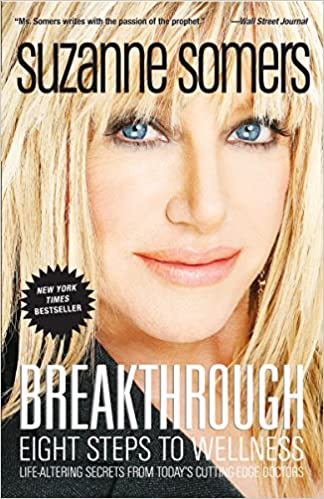
Anita: Yeah, I would agree with that completely. I’m glad you picked that to say because somebody said that some podcasters are listening to you lately and the guy had a phrase that really floored me—“It’s about time we started to bother to get to know ourselves.” Because business has never been separated from life, it’s never going to be separated from your body, from your brain, from your skin so you need to get to know how you operate not only as a psychological human being but also as a physical human being and that would lead to optimal results, I hope.
For sure! Okay, so how do the folks learn more about you guys, perhaps contact you if they want to work with you, or buy some of your products? I know in the Marketing Speak episode, you recommended AndreChaperon.com, Andre, but are there other sites that they can go to?
Andre: Yeah, it’s AndreChaperon.com for me and TinyLittleTotems.com for Anita. That’s just two blogs. Anita blogs and talks about the hormone, the health, and the movement stuff and I talk more about business on mine.
Thank you again, Andre and Anita! This was a fantastic episode. I’m super excited to check out the books that you recommended and dig deeper into hormones. Listeners, please take an action from this episode, don’t just kind of listen passively. Apply this in your life because it will make a difference and we’ll catch you on the next episode. I’m Stephan Spencer, your host of Marketing Speak.
Important Links
What Your Doctor May Not Tell You about Pre-Menopause
What Your Doctor May Not Tell You about
Andre Chaperon – previous episode
James Schramko – previous episode
Tim Ferriss – previous episode
Andre and Anita Chaperon – GYO previous episode
Shaahin Cheyenne – GYO previous episode
Jay and Joy – GYO previous episode part 1
Jay and Joy – GYO previous episode part 2
Chris Gatchis – GYO previous episode
Michael Port – GYO previous episode
Domingo Silvas – GYO previous episode
Your Checklist of Actions to Take










About Andre and Anita Chaperon
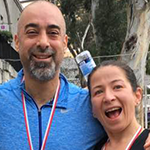 Andre and Anita Chaperon are an entrepreneurial couple living in Gibraltar and running several businesses together including AutoResponder Madness, Storyfluence, and Tiny Little Businesses. Andre has been a full-time internet marketer since October of, 2003, and with determination, consistency, and belief, has managed to build a great life around that. Anita is a hormone expert and is also responsible for the entire customer experience at Tiny Little Businesses. Together, they make an unstoppable team that is taking the online world by storm.
Andre and Anita Chaperon are an entrepreneurial couple living in Gibraltar and running several businesses together including AutoResponder Madness, Storyfluence, and Tiny Little Businesses. Andre has been a full-time internet marketer since October of, 2003, and with determination, consistency, and belief, has managed to build a great life around that. Anita is a hormone expert and is also responsible for the entire customer experience at Tiny Little Businesses. Together, they make an unstoppable team that is taking the online world by storm.







Leave a Reply